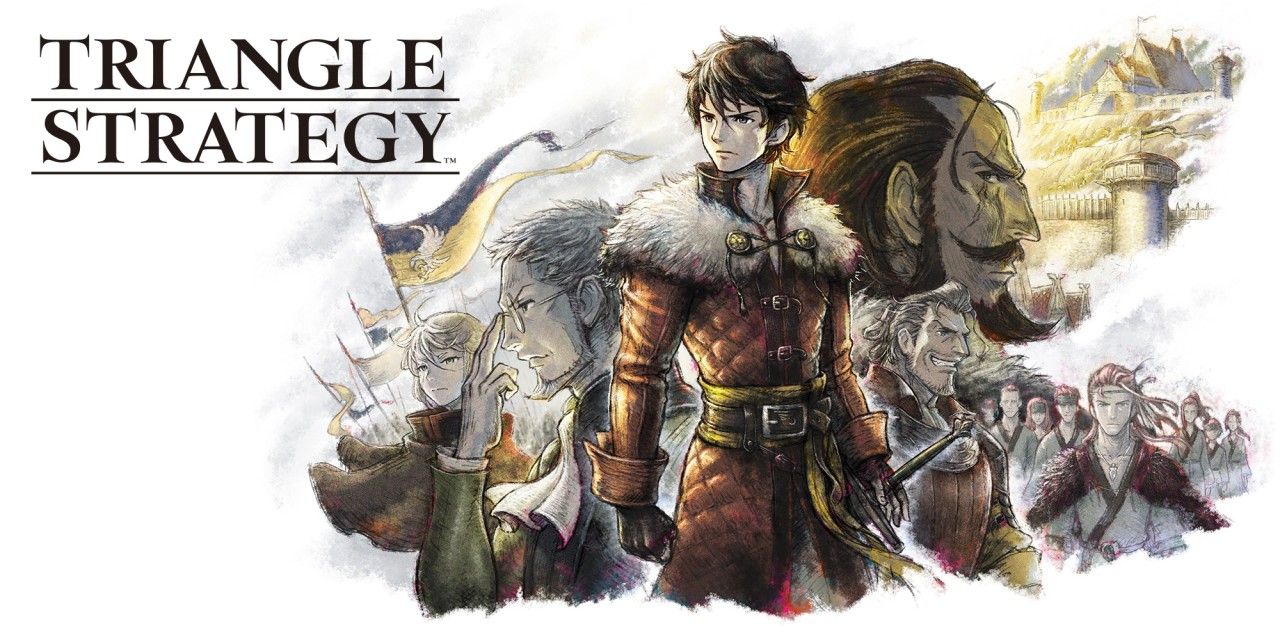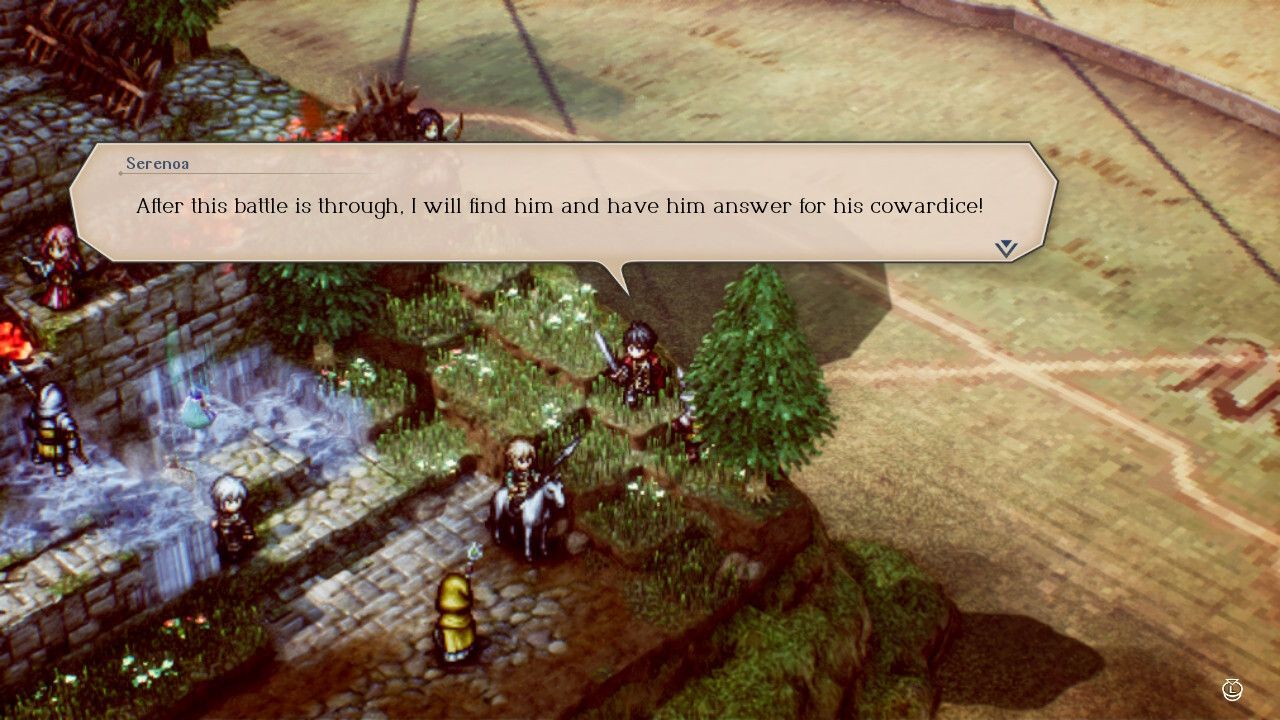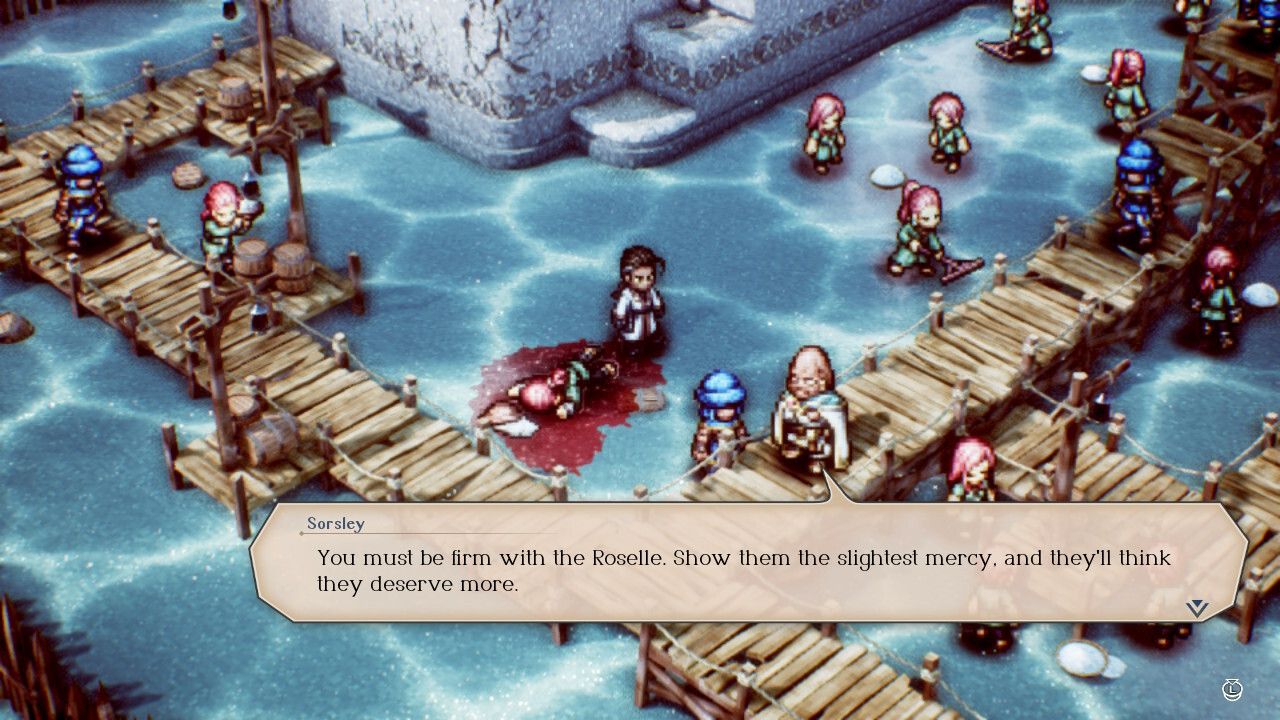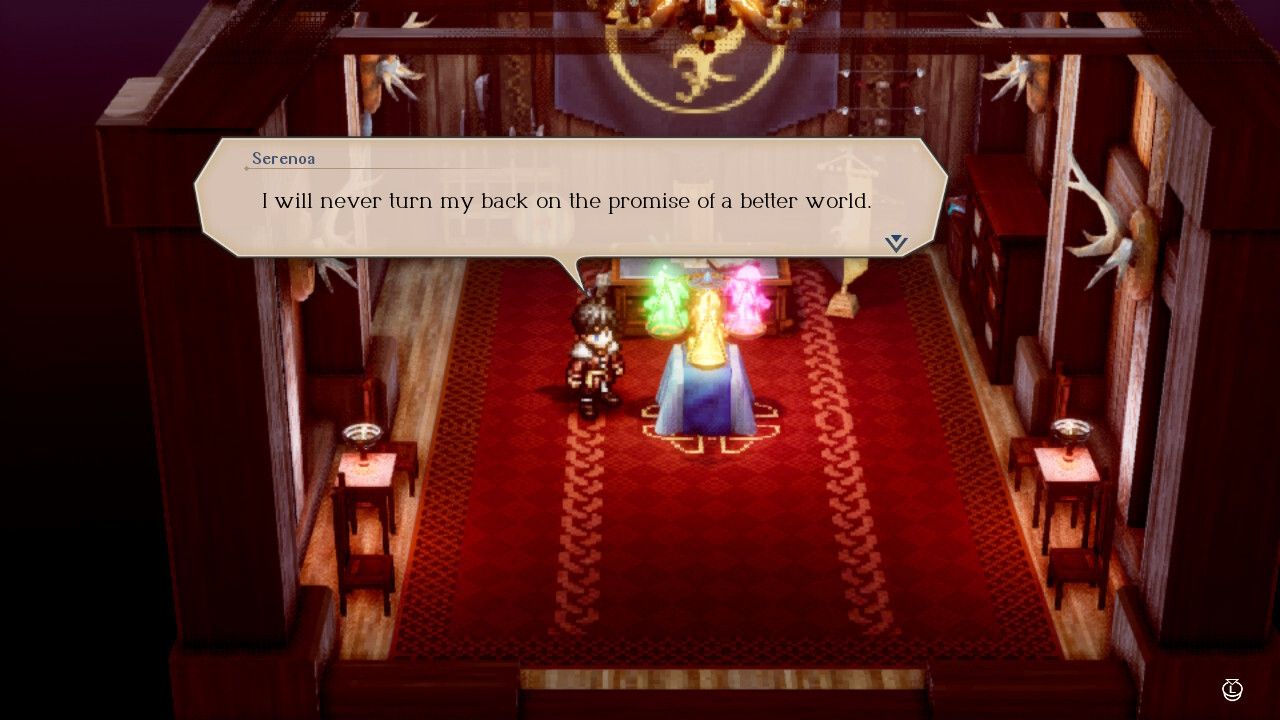A Drop Of Blood, A Pinch Of Salt: Triangle Strategy, And Endless War
Triangle Strategy's grand story echoes the truth of real wars

War is often waged over resources.
Oil. Water. Gold. Timber. Land. Wheat. Coffee. Materials. Weapons. When one powerful nation is limited by its resources and deems those resources should be taken from another nation, war becomes the resolute option. Even among the preamble of other proxy goals, wars of resources are the primary factor of our lifetime and the lifetimes of those who have lived before us—you have what I need, and I will take it.

War Never Changes
Triangle Strategy, the newest strategy RPG from SquareEnix's Tomoya Asano of Bravely Default and Octopath Traveler, tells a tale of military invasion, class warfare, racial tension, and political strife a la Final Fantasy Tactics. Initially mired by its questionable localization and bloated medieval diatribes, Triangle Strategy comes into its own at roughly the ten-hour mark, where it makes its intentions known between the twenty-odd chapters and subchapters. Initially about militant invasion and revolution, the true meat of Triangle Strategy rests in a plight for a singular resource: salt.
"No nation is rich enough to pay for both war and civilization. We must make our choice; we cannot have both." —Abraham Flexner
Taking place roughly thirty years after the Saltiron War (I'm sorry, I cannot help but continue to be aghast at the ludicrous title of "Triangle Strategy" when something along the lines of Trinity Tactics: The Salt War was right there), Triangle Strategy follows one Serenoa and his bride-to-be Frederica as they weather the storm of military invasion by the hands of Frederica's own kin, Gustadolph.
Helped by an impressive array of characters, Serenoa, Frederica, and Prince Roland take up the usual RPG trappings of young people fighting evil empires as they make important democratic decisions that dictate the story. Triangle Strategy takes as many notes from the journals of Tactics Ogre as it does Final Fantasy Tactics, providing the player with choice-based "routes" that can be determined by politically-weighted voting segments. Ultimately, getting the best ending of the game requires following a strict decision regimen, but every ending in the game provides important context for the conflict as a whole.

While Aesfrost, the nation to the north, seeks to invade Glenbrook following the death of Aesfrost's dearest son Dragan in the Grand Norzelian Mine, this conflict ultimately proves as nothing more than a dramatic pretense to the much larger stakes at hand. Aesfrost's invasions are due to the political maneuvering of Gustadolph, ultimately driven by his supervillain-esque personal desires.
While one can play through much of Triangle Strategy with the certainty that Gustadolph is the ultimate villain, he is nothing but a distraction from the truth—a resource monopoly owned by the religious body of Hyzante. Hyzante's own dark maneuverings are presented as ultimately holy and pure, encrusted in decades of zealotry as a neutrally devout entity. Their manipulations, gilded by religious symbolism and exceptionalism, are about nothing more than a spice.
A Pound Of Flesh
"All such tales of gods and their miracles are false. Those who would lead prefer that history suit their needs, and rewrite it to see that it does. And why shouldn't they? The fault lies not with them. The reeking masses yearn for gods and miracles. It is their opiate, and they consume it greedily." —Wiegraf Folles, Final Fantasy Tactics
In the background of Triangle Strategy, there is an aggressively clear division between the Haves and the Have Nots. While Frederica is a daughter of Aesfrost, she is also a Rosellan, a beleaguered people yoked under decades of brutal slavery and servitude by the Hyzantian Church. Hyzante's salt monopoly has never once been questioned in its decades of control, and it is to Frederica's horror that she learns the punished Rosellans have long been used as material slaves for excavating the precious salt from its "singular" resource. The truth of matters is even more dangerous—unlike other JRPGs where the grand plot twist is predicated on mutated godhood or supernatural elements, Triangle Strategy seeks only to inform the player that salt is not in fact a limited resource whatsoever.

Between the 14th and 16th centuries, the world was enraptured by spice. The Spice Trade was more than a luxury—it triggered wars, ballooned the slave trade, and caused empires to rise and fall. Colonialism was built upon the backs of those who could not defend themselves, and more industrialized and militaristic nations moved through poor countries like threshers through wheat fields. The British and the Dutch torched entire fleets and stole resources beyond counting from India, Bangladesh, China, Turkey, Pakistan, Africa, and Portugal. Saffron, caraway, cinnamon, juniper, sumac, pepper, and of course salt. Resistance was met first by the sword, then by the gun. Wars are fought for resources—but to label colonialist slaughters as "war" feels disingenuous, small, and cruel.
The Rosellans in Triangle Strategy committed the most sinful act that could be observed by the capitalist-religious fusion of the Hyzantian empire—they confirmed that salt did not exist solely in one locale, but was plentiful in mines across the world. The war in Triangle Strategy, the true war, is one of attrition and control. It is a war of slavery and resource management, where one singular governing body places ownership over not just a physical resource, but a spiritual one. By confirming itself as an indefatigable justice of state and godhood, Hyzante uninvites scrutiny and protects itself from the warring tribulations of smaller bodies such as Glenbrook and Aesfrost. These other nations will come and go with time—Hyzante will stay, and control the salt.
A Grain Of Salt
"In some cases, the materials at stake will be viewed as so essential to national survival or economic well-being that compromise is unthinkable." —Michael T. Klare
Serenoa, Frederica, and Roland realize there is only one true path forward: conquer the evils of Hyzante, free the Rosellan people, and rediscover their land of Centralia and any additional sources of precious salt. All historical dissidents of Hyzante have been suppressed to the point of obliteration. Those surviving Rosellans not in hiding slave away in the salt lakes beneath Hyzante (called the Source), and rebellious Rosellans are put to the sword, like Frederica's own poor mother.
This is the intolerable cruelty of resource wars and the manipulation of religious imagery and control upon nations whose peoples cannot possibly fight back. Nothing in Triangle Strategy is beyond comprehension—we live in a world where powerful countries control monopolies, suppress lesser nations, and outright steal ancestral homes. Like Final Fantasy Tactics and Tactics Ogre, the greater narrative of Triangle Strategy seeks to align itself with historical precedent—and it eerily succeeds.

Almost every war in history—especially in American history—has been touted as a great defense of freedom, agency, and country. In truth, most wars are fought for resources, religion, and greed. The American Revolution was about trade routes and commodities. Britain's great wars were over controlling India. The American Civil War—while ultimately over slavery—was about controlling the cotton trade. Wars beyond counting generated by Germany, Russia, and Iraq were made over oil reserves.
There is a pivotal and crucial moment near the end of Triangle Strategy where the political characters inevitably unify with their sworn enemy of Aesfrost in order to take down the Hyzantian empire, because they come to terms with the fact that the ultimate enemy is the one of control, manipulation, and inhumane policies. The blood of countless Rosellans salted the ground for decades upon decades, and absolutely none of it was harvestable.
Living under capitalism, political oligarchies, or religious extremism shares a common theme across the board—a drive for imperial power. Any student of history knows the perennial goal of a ruling body is control, and Triangle Strategy presents a sobering and steady reminder of the weightiness behind these sorts of titles. Beyond the entertainment of a strategy RPG, what must be emulated along the lines of Final Fantasy Tactics and Tactics Ogre is the importance of historically contextual storytelling. Wars over resources are evil, and much more real than gods or monsters.
“People say we’re not fighting for oil. Of course we are.” —Defense Secretary Chuck Hagel
Suing For Peace
While its final act devolves into traditionalism, Triangle Strategy's Golden Route delivers a fancy of moral warfare, where the driving decisions behind the acts of Serenoa and Glenbrook are to improve the world and upend the status quo. We are given only a glimpse of what occurs after the fall of Gustadolph and the eradication of Hyzante's Hierophant and its Holy State, and what the future might hold for the newly freed Rosellans. The state-sanctioned enslavement of the Roselle, informed by Hyzante's own structured Teachings of the Goddess, labeled them as tyrannous aggressors who deserved to slave away in the Source's salt mines. It is by this power of authority that Hyzante was able to subtly control the world, inviting anyone to disagree with the Goddess if they were to disagree with their rules. Glenbrook's atheistic attack on the structure of Hyzante was more than a salvation, it was a judgment.
What occurs in these final moments, and truly what occurs throughout Triangle Strategy's snapshot narrative, is the accumulation of decades of struggle. Serenoa, Frederica, Prince Roland, and their retinue were only able to finally undo the cruelties of Hyzante because of those who had lived and died before them, nameless heroes who resisted pitiless wars and cruel subjugators. It took more than a few drops of blood to finally sue for peace, but the results were inarguably worth their cost. The fight for resources was a fight for an enslaved people—a person is worth more than a pillar of salt.
